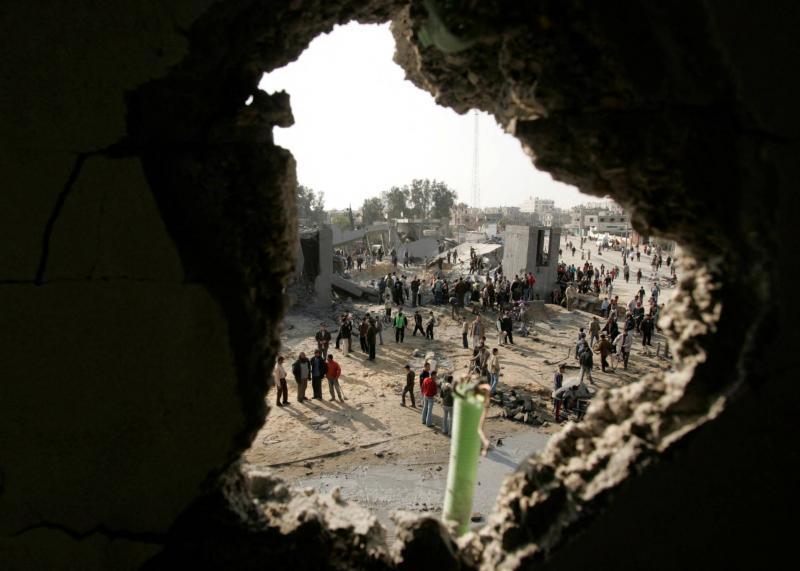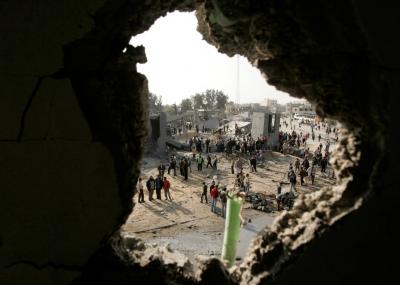Israel imposed a complete blockade on the Gaza Strip after Hamas launched an unexpected attack by its fighters across the border fence early Saturday morning, resulting in the deaths of at least 1,300 civilians and soldiers. The Gaza Strip has been a front in the conflict with Israel for decades and has been almost completely isolated from the outside world for 16 years. Below are the key points in the recent history of the region and its long-standing economic isolation:
* **From the Heart of the Conflict**
The borders of the Gaza Strip were established following the 1948 war when Egyptian forces took control of the 40-kilometer long region, including the city of Gaza. The area remained under Egyptian control for most of the next two decades until Israel captured it during the 1967 war. The Gaza Strip became a focal point in the Palestinian uprisings in 1988 and 2000. As it became clear how difficult a comprehensive peace agreement between Israel and the Palestinians would be, Israel evacuated all its citizens and soldiers from Gaza in 2005.
* **Imposition of the Blockade**
After Israel withdrew from the Gaza Strip, it imposed a temporary land, air, and sea blockade, along with restrictions on exports and a significant limitation on who could enter. Israel cited security concerns, and the blockade became permanent starting in 2007 after Hamas took control of the Strip, defeating fighters loyal to President Mahmoud Abbas in a brief civil war. Egypt also supported the blockade to some extent by enforcing strict measures, seeing Hamas as a threat to its stability. The border between Egypt and Gaza stretches approximately 12 kilometers.
* **Living Conditions**
Human Rights Watch indicates that Israel has transformed the Gaza Strip for its 2.3 million rapidly growing population into an "open-air prison," with assistance from Egypt. In a report published this year, UN agencies estimated that 58 percent of the population needs humanitarian aid, with 29 percent of families living in dire or catastrophic conditions. These figures represent a peak in severe deprivation compared to 10 percent in 2022. The UN Office for the Coordination of Humanitarian Affairs states that food assistance is required for nearly 1.3 million people. The Palestinian Water Authority reported that over 90 percent of the available water in Gaza is unsuitable for drinking. Very few Palestinians receive permits to visit relatives or friends in the West Bank, though Israel has recently increased the number of work permits for Gaza residents. For most, the Rafah crossing to Egypt is the only exit, but travelers must register weeks in advance on a long waiting list. Egypt allowed the exit of 19,608 people from Gaza in August, the highest number since July 2012, according to UN data. Israel permitted the exit of 58,606 individuals, mostly daily wage laborers, which is a 65 percent increase from the monthly average in 2022, although it remains 88 percent lower than levels seen in 2000.
* **Economic Impact**
Long-standing restrictions have severely limited Palestinians’ access to the Israeli labor market, which was a major source of employment before the 2000 uprising. The Office for the Coordination of Humanitarian Affairs states that the unemployment rate in Gaza is among the highest in the world, sitting at 46 percent, with youth unemployment reaching about 70 percent, according to the latest data from the Palestinian Central Bureau of Statistics. The International Monetary Fund estimates that the per capita income in Gaza is about a quarter of that in the Israeli-occupied West Bank. Israel imposes restrictions on imports to Gaza of goods it deems could be used for military purposes, such as cement and iron rods. Ironically, before the Hamas attack, there had been a rise in imports this year, and it appeared that the export market in Gaza was on the verge of reaching its highest level since 2007.
* **Total Siege**
On Monday, Israel announced a complete blockade of the region, prohibiting food, fuel, and water from entering Gaza and closing all crossings. Egypt also closed its crossing into Gaza. The sole electricity station in the area has stopped operating, and fuel needed to run emergency generators in hospitals is running out. The International Committee of the Red Cross is demanding that fuel be allowed into hospitals, but Israel has ruled this out unless Hamas releases hostages it holds. The United Nations World Food Programme has called for the establishment of humanitarian corridors to bring food into Gaza, warning that supplies could run out quickly.




